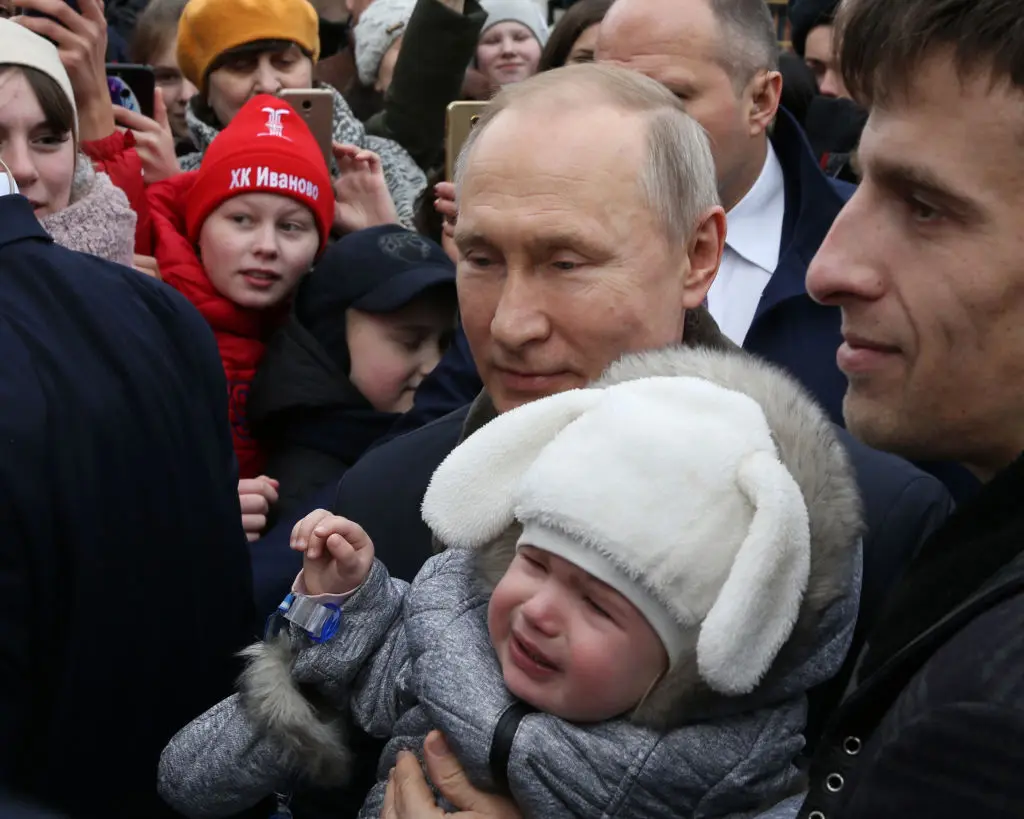China will not supply weapons to Russia following classified documents release
Former CIA Station Chief in Moscow Dan Hoffman told “Your World” that Russia is in “dire straits” from the war and is confident that Putin asked China for weaponry assistance.
Russia is in the midst of a historic population decline as it continues to grapple with low birth rates, high emigration, staggering health statistics and a deadly war in Ukraine. The growing crisis has been described by some as a “silent war” against its own human capital.
Russian President Vladimir Putin has listed Russia’s declining population as a matter of national security, but his recent war in Ukraine has not only led to hundreds of thousands of additional deaths among fighting-age men but has pushed a mass exodus among Russia’s younger populations.
Western defense officials have estimated that as many as 250,000 Russian soldiers have died in Ukraine, and some reporting has suggested that up to 1 million people have fled Russia since the war began – particularly following Putin’s conscription order in September 2023.
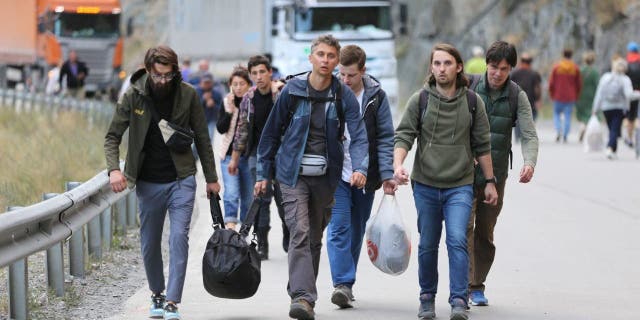
Russians are seen attempting to leave their country at the Kazbegi border crossing in Stepantsminda, Georgia, on Sept. 28, 2022. They were seeking to avoid a military call-up for the Russia-Ukraine war. (Davit Kachkachishvili / Anadolu Agency via Getty Images)
OVER 1 MILLION YOUNG RUSSIANS LEFT WORKFORCE AS PUTIN FOCUSED ON UKRAINE CONFLICT: REPORT
But even with the loss of hundreds of thousands of men since Putin launched his invasion 14 months ago, the war is not the main cause of Russia’s demographic struggles.
Moscow has been grappling with a declining population for 30 years, but one demographic expert said this fact in and of itself is not actually the No. 1 problem that’s crippling Russian societal advancement.
“It’s possible for an aging and shrinking society to prosper,” demographic and economic specialist Nicholas Eberstadt, who holds the Henry Wendt chair in political economy at the American Enterprise Institute, told Fox News Digital. “But Russia is not doing that.”
“They have a health crisis with … astonishingly high death rates for working-age men and even working-age women, and they also have a strange inability to harness their seemingly highly educated population to create knowledge and economic value,” he said. “They have a crisis.”
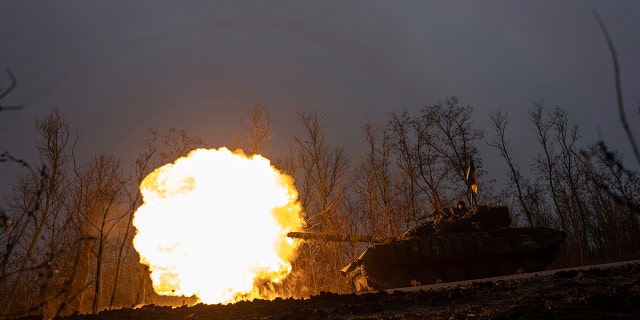
A Ukrainian tank towards fires towards Russian positions at the frontline near Bakhmut, Ukraine, Wednesday, March 8, 2023. (AP Photo/Evgeniy Maloletka)
Experts are flummoxed when it comes to Russia’s high infertility rates and high death rates, particularly among men.
Eberstadt, who has monitored Russia’s declining population for decades and wrote a book in 2010 called “Russia’s Peacetime Demographic Crisis,” explained that Russia has certain health factors, like alcoholism and dietary practices, that contribute to higher rates of top killers like heart disease.
But the expert said that these factors should equate to roughly twice the rate of deaths in Western Europe and not the rate currently seen in Russia, which is four times the mortality rate reported by its Western neighbors.
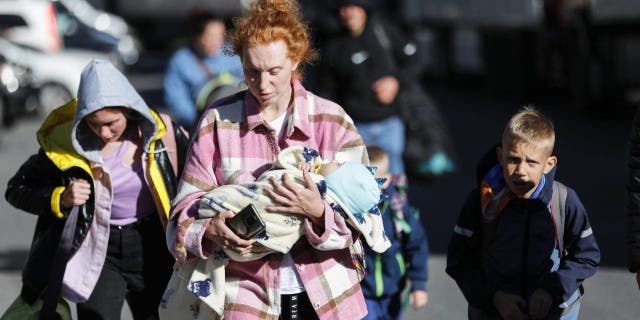
Russians are seen attempting to leave their country at the Kazbegi border crossing in Stepantsminda, Georgia, on Sept. 27, 2022. (Mirian Meladze / Anadolu Agency via Getty Images)
“So, what’s going on?” he said. “It’s almost as if Russia has managed to come up with a new formula for achieving premature death.”
Russia’s population dropped by half a million people in 2022, with more people dying than having been born and pushing the national population to 146.45 million people by the start of 2023, according to Russian media group RBC earlier this month.
Moscow’s Higher School of Economics (HSE) also estimated that Russia will need to see up to 1.1 million immigrants a year for the next 80 years if it wants to maintain current population levels by the end of the century due to its rate of infertility, mortality and life expectancy.
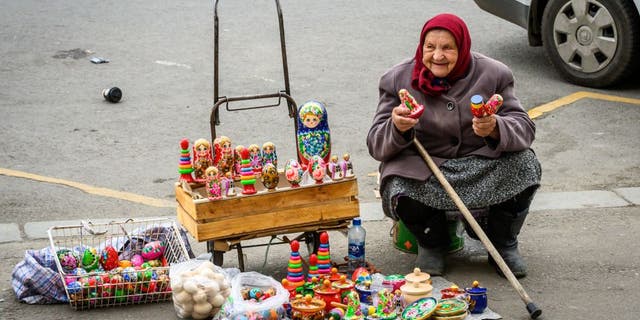
A woman sells Easter eggs and Russian souvenirs on a street in central Moscow on April 20, 2019. (Mladen Antonov / AFP via Getty Images)
According to a report by The Economist last month, the low birth rates in April 2022 were equivalent to levels not seen since World War II, and the life expectancy of a 15-year male is on par with that of a 15-year-old boy in Haiti – which is the poorest nation in the Western Hemisphere and plagued by natural disasters, a crippling economy and extreme gang violence – though Fox News Digital could not independently confirm these figures.
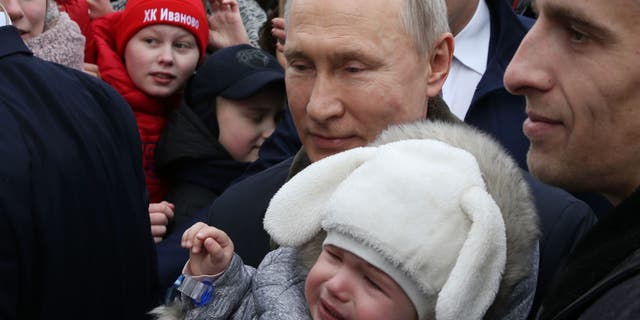
Russian President Vladimir Putin hugs a crying baby as he greets residents in Ivanovo, Russia, on March 6, 2020. (Mikhail Svetlov / Getty Images)
“Since such high values of compensatory migration are impossible to achieve, we can conclude that the population is expected to decline even under the most favorable scenarios of birth rates and mortality,” according to authors of the study.
The study also did not factor the number of deaths Russia has seen during the war in Ukraine or the substantial exodus of Russian residents since.
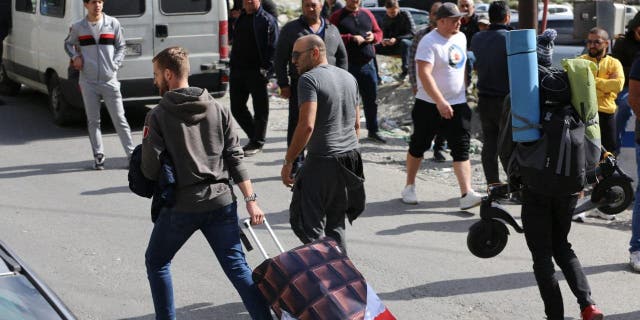
Russians are seen attempting to leave their country at the Kazbegi border crossing in Stepantsminda, Georgia, on Sept. 30, 2022. They were seeking to avoid a military call-up for the Russia-Ukraine war. (Davit Kachkachishvili / Anadolu Agency via Getty Images)
CLICK HERE TO GET THE FOX NEWS APP
“There will be some impact on births from this, but I wouldn’t want to exaggerate it,” Eberstadt said, noting that the fallout from the estimated 1 million COVID-related deaths are likely to have a far more substantial impact on Russian demographics than the war in Ukraine.
“What I may think will be incalculable is how this invasion is going to affect the Russian national mood. If it leads towards a sort of a pessimism, that may have an impact on the birth rate. Already we’ve heard that the births from last year were the lowest in decades,” Eberstadt said. “If that continues, maybe we’ll have our answer there.”
